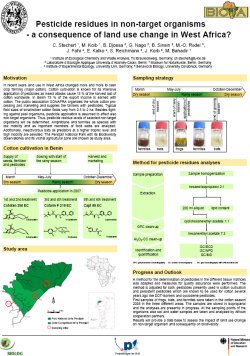|
|
|
 |
|
|
Presentation
< back to presentation overview
| Details of the presentation |
| Presentation |
Poster presentation |
| Title |
Pesticide residues in non-target organisms - a consequence of land use change in West Africa?
|
| PDF Download |
 Download PDF (Filesize 191 kByte)
Download PDF (Filesize 191 kByte)

|
| Short title |
Pesticide residues in non target organisms
|
| Author(s) |
Stechert, C.(1); Kolb, M.(1); Djossa, B.(2); Nago, G.A.(2); Sinsin, B.(2); Rödel, M.-O.(3); Fahr, J.(4); Kalko, E. (4); Reichmann, S.(5); Korb, J.(5); Bahadir, M.(1)
|
| Presenting author |
Stechert, C.
|
| Institution(s) |
(1) Institute of Ecological Chemistry and Waste Analysis, Technische Universität Braunschweig; (2) Laboratoire d´Ecologie Appliquée Université d´Abomey-Calavi; (3) Museum für Naturkunde, Berlin; (4) Institute of Experimental Ecology, Universität Ulm; (5) Behavioral Biology, Universität Osnabrück
|
| Keywords |
pesticide residues; non-target organisms; land use change; cotton; cash crops
|
| Abstract |
One consequence of land use change to cash crop farming e.g. cotton farming is the regular pesticide application according to specifications of the public cotton associations. Pesticide residues in selected non target organisms (bats, amphibians, termites) are under examination to assess whether the organisms could be seriously affected. The Pendjari region in northern Benin with the Pendjari National Park representing an undisturbed area without any intended pesticide entry and the neighbouring disturbed area with typical smallholder farms are under investigation. Amphibians and soil arthropods are chosen as taxa with utmost site fidelity of low mobility and important members of food webs acting as predators and being consumed as prey. In addition, insectivorous bats are selected as predators at a higher tropic level that are among others important for pest control. Due to the high mobility they are supposed to integrate pesticide contamination over larger areas on the landscape scale.
|
| Congress Topic |
Land use, impact and value
|
| Topic No. |
--- |
| Notes |
---
|
| Ref. No. |
569 |
|
|
|
